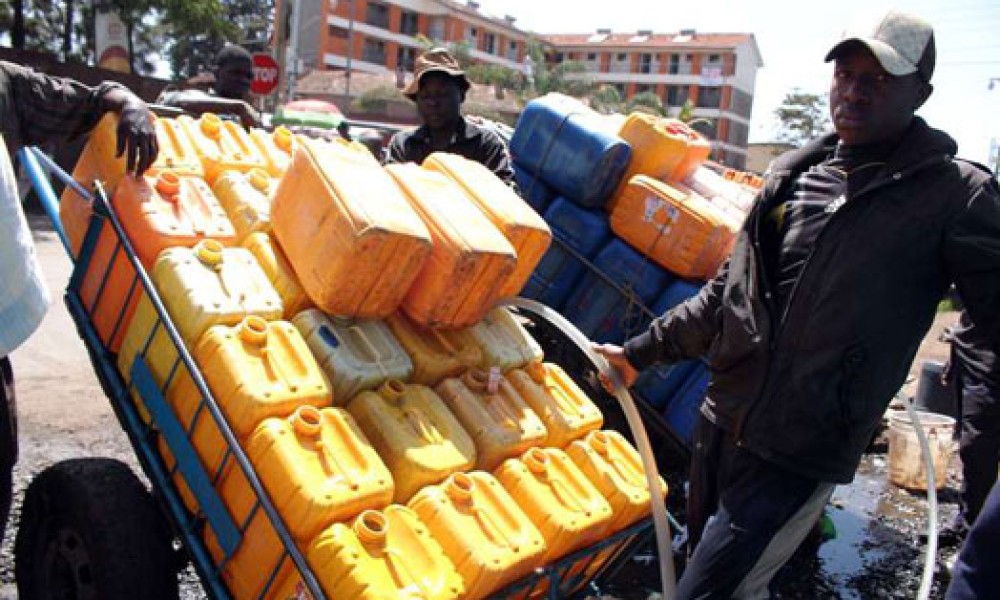Nairobi City County has started rationing water for the more than four million city dwellers in a move the authorities say is unlikely to change in the foreseeable future.
In a report by the People Daily,for almost a month now, most city residents have been forced to buy the essential commodity at exorbitant prices from water vendors despite the ongoing heavy rains being experienced in most parts of the country.
Most estates have reported having had acute water shortage since the beginning of the year despite them paying water bills religiously.
The publication reports furher that most estates are now receiving water for not more than three days in a week, with some only receiving it once.
Yesterday, Nairobi City Water and Sewerage Company (NCWSC) appeared to throw blame on old infrastructure that cannot sustain the rising demand from the ever increasing population.
The revelation by NCWSC managing director Nahashon Muguna comes amidst water rationing by the utility firm in a number of estates including Huruma, Utawala, Highrise, Pangani, Kawangware, Embakasi, Dagorreti, Kariobangi, Uthiru, Riruta, Zimmerman, South B, Kahawa West, Garden Estate, Kileleshwa, Umoja, Ngara, Dandora, Ongata Rongai, Karen and Mathare North, where residents get the commodity at most three times a week.
“Most city estates are facing acute shortage of the commodity. Although we are trying our best to address the situation, there is very little that we can do,” Muguna said.
Sources revealed that the situation is not expected to improve with the anticipated heavy rains that the Kenya Meteorological Department has predicted to last until June.
People Daily understands that the last time water supply infrastructure for Nairobi was developed was in 1987 and it was meant to serve the city with a population of 2.6 million which has since increased to 5.3 million exerting pressure on the existing infrastructure.
“For us to at-least ensure that every city resident, the reality is that we will continue to ration water. The demand is growing higher and higher and with the current production, we cannot sustain to have water in every person’s door everyday,” Muguna said.
He added that the NCWSC has a treatment capacity of 525.6 million litres per day, which is against a demand of 900 million litres in Nairobi.
“Nairobi City County has four sources of water namely Kikuyu Springs, Ruiru, Sasumua and Thika dams. The water is treated in Ngethu, Sasumua, Kabete and Kikuyu Water Treatment Works.
The four have an installed maximum daily production capacity of 440 million, 61 million, 20 million and 4 million litres respectively,” Muguna said. He said the city water supply system is limited to the installed production capacity and this is why the supply will remain constant.
Nairobi Governor Johnson Sakaja said despite this, they are working to reduce the water demand and supply gap.
“To reduce the gap of water demand and supply in the city, the National and County governments through the Athi Water Works Development Agency (AWWDA) are developing the Northern Collector Tunnel Phase 1 Water Project which was supposed to be commissioned last month and is expected to deliver an additional 140 million litres of water to the city per day.”
“Furthermore, the Karimenu Dam Water Project being developed by AWWDA is in the final stages of completion and is supposed to deliver 23 million litres of water per day to the city.”
He said once the projects are complete, city residents will receive water at least thrice a week.
Sakaja added that Nairobi county and the national government have also secured $100 million in funding for the development of Phase II of the Northern Collector Tunnel in Murang’a. The tunnel will provide an additional 120 million litres of water per day.
Chairman Water Committee Nairobi County Assembly Rexon Otieno admitted that water rationing has been rampant in the city.
“These complaints are all over. Sometimes we even have to set aside money to buy water for our residents. As a committee, we have advised that a new treatment plant should be set up immediately,” he said.
Sylvia Ndunge, a resident of Huruma estate said for the last three months, having water daily in her house has been a tall order.
Actually, in Ndunge’s words, for you to live in Huruma, you must set aside extra cash to buy the precious commodity.
“Out of the usual rent one pays, you must have close to Sh10,000 to buy water with. The unfortunate thing is that most of this water which we are usually supplied with by the water vendors is not so fit for human consumption.
"We usually live prepared to visit the hospital to be treated for illnesses such as typhoid,” said Ndunge.




